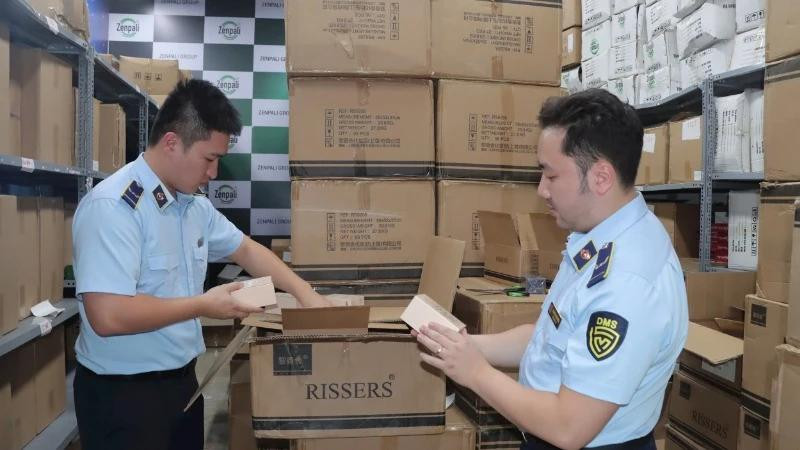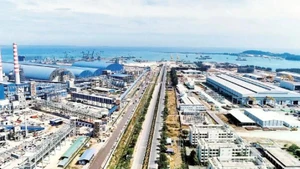However, alongside this development, the illegal trade and transportation of smuggled goods, counterfeit products, and substandard items remain complex and rampant. These activities negatively impact consumers, law-abiding businesses, and the overall economy. Therefore, market management forces must build on their previous achievements to remain a key force in managing and developing the domestic market.
Safeguarding production and consumption
On March 1, the Vietnam Directorate of Market Surveillance officially ended its operations at the central level after more than six years, merging with the Agency for Domestic Market Surveillance and Development under the Ministry of Industry and Trade. At the same time, provincial-level market surveillance departments were transferred to local authorities and restructured into district-level offices. This marks the beginning of a new phase for the market surveillance force, which now faces greater demands and challenges in a changing domestic trade landscape. The six-year journey operating as a general department left a notable imprint, especially in market control efforts, affirming the key role of the force in combating smuggling, counterfeiting, and commercial fraud.
According to the the Agency for Domestic Market Surveillance and Development, since October 2018, the national market surveillance force has inspected nearly 666,000 cases, imposed administrative penalties on nearly 418,000 violations, and referred 911 cases for criminal prosecution. The total value of penalties is estimated at over 5.542 trillion VND, of which 3.376 trillion VND was paid into the state budget. The confiscated goods, vehicles, and related assets amounted to over 2.166 trillion VND.
These figures reflect the tireless efforts of the entire force and show the effectiveness in maintaining trade stability in the domestic market and protecting the legal rights of businesses and consumers. Inspections and enforcement actions were carried out nationwide, systematically and continuously. Fragmented and inconsistent practices in handling violations have been largely addressed.
Several major and complex cases were detected and prevented in time, garnering public attention—such as the seizure of 36,000 methamphetamine tablets and synthetic drugs in Ha Tinh and the inspection and temporary confiscation of around 40 tons of goods, including cosmetics, supplements, fashion items, household goods and imported alcohol across eight warehouses and business locations in Hanoi and Hung Yen.
E-commerce has also been a spotlight in recent market management efforts. Authorities proactively monitored and stopped violations in the online environment. In 2024 alone, over 3,124 violations in e-commerce were detected and handled (a 266% increase compared to 2023), with four cases transferred for criminal investigation and 48 billion VND in administrative fines (up 220%). The value of violating goods exceeded 34 billion VND (up 440% compared to 2023).
In addition, the market management force has made notable progress in technology adoption and digital transformation to enhance efficiency. A centralised database system for area management, inspection results, and administrative penalties has been effectively built and operated, enabling rapid violation trend forecasting and timely solutions. International cooperation is also a highlight, with multiple Memorandums of Understanding signed with domestic and international organisations and businesses to strengthen intellectual property protection, fight counterfeiting, and ensure food safety and hygiene.
Continuing as a key force in combating smuggling and counterfeiting
 |
| Raising awareness against counterfeit goods and protecting intellectual property rights remains a vital task of the market management force. (Photo: Luu Quyen) |
The merger with the Agency for Domestic Market Surveillance and Development and the transfer of 63 provincial market management departments to local governments under Decree No. 40/2025/ND-CP is a strategic move to streamline the organisational structure, enhance effectiveness, and help the force adapt to new economic demands.
However, this organisational change requires more than just structural adjustments—it demands an expanded mission. Beyond inspection and market control, the force must now actively contribute to the sustainable development of the domestic market. Therefore, the Agency for Domestic Market Surveillance and Development must clearly define strategies and tasks that meet current needs and help build a transparent, healthy business environment that protects consumer rights.
Mr Tran Huu Linh, Director of the Department, emphasised that although the organisational model has changed, the core duties remain: providing inspection guidance, coordinating with ministries, sectors, and localities to combat counterfeit goods, and supervising the entire national market management force.
Looking ahead, more sophisticated and complex violations are expected, especially involving counterfeit and intellectual property-infringing goods, and activities across digital platforms. These pose growing challenges for market managers. Stronger, closer cooperation between localities and the Ministry of Industry and Trade will be essential for the force to continue fulfilling its assigned tasks effectively.
To meet the country's development demands in this new era, the Department must build on past achievements and continue serving as the backbone in the fight against smuggling, trade fraud, and counterfeit goods.
Efforts must also be made to strengthen collaboration with local authorities—especially in policy-making and improving professional mechanisms and policies for market management officers. Simultaneously, comprehensive solutions must be implemented—covering technology, human resources, and policy—to foster a safe, transparent, and healthy business environment. This will not only protect consumer rights but also empower domestic businesses to expand production and trade, contributing to the overall growth of the national economy.
















